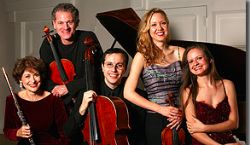|
Symphony
FROM THE NEW WORLD TO THE OLD WORLD
by Peter Lert
Saturday, June 14, 2025
Chamber
MC2 DUO RECITAL CLOSES 222'S SEASON
by Terry McNeill
Saturday, June 14, 2025
Choral and Vocal
CANTIAMO SONOMA'S LUSCIOUS A CAPELLA SINGING IN SEASON ENDING CONCERT
by Pamela Hicks Gailey
Sunday, June 8, 2025
Symphony
SRS SEASON ENDS WITH RESOUNDING TA-TA-TA-BANG
by Terry McNeill
Sunday, June 1, 2025
Symphony
YOUTHFUL VIRTUOSITY ON DISPLAY AT USO'S MAY CONCERTS
by Peter Lert
Saturday, May 17, 2025
Symphony
MYSTICAL PLANETS AND LIVELY GERSHWIN ORTIZ AT FINAL SRS CONCERT
by Peter Lert
Sunday, May 4, 2025
Symphony
VSO'S CONCERT MUSIC OF TIME, MUSIC OF PLACE
by Peter Lert
Sunday, April 27, 2025
VOCAL ELEGANCE AND FIRE AT THE 222'S RECITAL APRIL 26
by Pamela Hicks Gailey
Saturday, April 26, 2025
CANTIAMO SONOMA SINGS AN INSPIRED GOOD FRIDAY MOZART REQUIEM CONCERT
by Pamela Hicks Gailey
Friday, April 18, 2025
DRAMATIC SHOSTAKOVICH SYMPHONY CLOSES PHILHARMONIC'S 25TH SEASON
by Terry McNeill
Sunday, April 13, 2025
|
 |
 American Chamber Players |
RARE LEKEU QUARTET HIGHLIGHTS SEASON OPENING RAC CONCERT IN OCCIDENTAL
by Nicki Bell
Saturday, October 19, 2019
The five musicians of the American Chamber Players brought mostly unfamiliar music to their Oct. 19 Redwood Arts Council concert in Occidental’s intimate Performing Arts Center.
Violist and group founder Miles Hoffman spoke briefly to the audience to open the evening. An instantly engaging speaker, he has been heard for years on NPR’s “Coming to Terms” and has authored NPR Classical Music Companion, and discussed the program which proved to be varied, fascinating and delightful. It was a first concert with RAC’s 40th season and the hall’s new piano, a Kawai grand with beautiful tone, and the audience packed the hall.
Mozart’s Flute Quartet in D Major, K.285, set a tone of musical warmth and clarity, with luscious ensemble and a joyous intimacy, like in a large living room with musicians circled on a Persian carpet. It seemed a music party. Flutist Sara Stern’s phrasing in the the Mozart was exquisite. In the Adagio the flute aria soared above plucked strings and led seamlessly right into a joyous Rondo of high spirits.
Three Jewish Songs for viola, cello and piano followed, written by violist Max Raimi in 1980, and they were originally composed for his family to play at Passover family gatherings. Raimi has written numerous works for the American Chamber Players. Entitled Kuma Echa (Arise Brother), Eliahu Hanovi (Elijah the Prophet) and Nigun Bialik (a wordless melody), these were fun works with a “get up and dance” spirit, and likely are meant to be heard while having shots of slivovitz, a lethal Balkan brandy.
Philippe Gaubert’s “Three Watercolors” for flute, cello and piano (1926) filled out the first half. Gracious, impressionistic, lyrical, they were beautiful showcases for the Ms. Stern, cellist Stephen Balderson and pianist Anna Stoytcheva. The music was played with great attention to color and nuance, and unfolded with grace. “On a Clear Morning” was played with flashes and ripples of compelling sound. “Autumn Evening” was far quieter and atmospheric, with beautiful cello and flute duets. There was Debussy character in the music with suggestions of darkness to come. The final “Serenade” was performed with a dance spirit, the playing imaginative and akin a story being told. Many in the audience smiled at the conclusion.
Intermission featured wine, home-baked goodies, CD’s of 40 years of artists who have played at the RAC, a raffle and time for strolling through the adjoining art gallery.
Beethoven’s “La ci dame la mano” Variations (from Act 1 of Mozart’s Opera “Don Giovanni”), was written when the composer was 25, and arranged here for flute, violin and viola. The piece was full of charm, texture and mood, each instrument having their variation to shine. As in the best of chamber music, the performance felt like a game of finishing each other’s sentences, and it brimmed with lightness and humor. The audience was chuckling as it ended with a “the…end”
The last piece, a two movement B Minor Quartet for piano and strings by Guillaume Lekeu was quite novel and captivating. Coming to Paris from Belgium to study with Franck and later D’Indy, Lekeu died at 24 from typhoid fever. This quartet, unfinished in 1894, was his last work. A very passionate first movement (“Dans un emportement douloureux”) is followed by a expressive nocturne (“Lent et passionne”), and the entire work was completed by D’Indy. A third movement, a culmination of the other two, was never written. Mr. Hoffman said from the stage that “Given the sumptuousness of the first movement and the extraordinary, almost unearthly beauty of the second, this would be been quite an accomplishment”. In its first public performance in Paris in 1896, Debussy insisted on being the pianist.
Rich and passionate, the Lekeu Quartet was played passionately with appeals to happiness, cries of love, pain and suffering, despair and joy. Full sonorities played at full throttle. The beauty of the piano line and the marvelous violinist Joanna Maurer shining forth made a combination that was both potent snd exhilarating. Dark and quiet, the second movement was played in a way that consoled the spirit. Rich Romantic emotions seem to be reflected in thee faces of the musicians, especially from Ms. Maurer, perhaps both sad and profound.
At the end there was a standing ovation, the only possible response to the performance.
Sonia Morse Tubridy contributed to this review.
|
